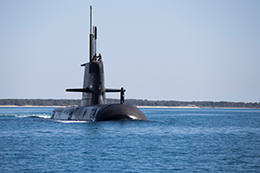07 November 2018
 Multinational defence industry leaders, Thales, will be sponsoring a PhD at the University of South Australia’s Behaviour Brain Body Research Centre to look at advanced Artificial Intelligence and its application to the future of anti-submarine warfare.
Multinational defence industry leaders, Thales, will be sponsoring a PhD at the University of South Australia’s Behaviour Brain Body Research Centre to look at advanced Artificial Intelligence and its application to the future of anti-submarine warfare.
The research is a joint UK-Australia initiative that will help to optimise advanced Artificial Intelligence (AI) within complex maritime combat systems in support of human operators. The results from the research will be integrated into spiral capability improvements for Thales’s high-performance sonar solutions.
Key to the research project will be combat systems operators and their well-being.
While systems benefit from increasing levels of automation, understanding the impact on operators, their behaviour, fatigue and sleep patterns is essential.
The goal of the Thales sponsored PhD at UniSA’s Behaviour Brain Body Research Centre will be to find ways to ensure that as increased levels of autonomy and automation are introduced into service the operator remains central in the maritime mission system.
Thales Australia CEO Chris Jenkins says the research is another step in a long-term program of collaboration and co-development of world-leading sonar solutions for both surface ships and submarines.
“We have been working closely with the UK in the area of sensor development for sonar arrays for over ten years,” Jenkins says.
“This collaboration between Thales and UniSA will extend our collaboration into inboard systems.”
As Australia’s maritime environment becomes more congested, the effective use of advanced AI will help operators to maintain their optimum level of effectiveness during periods of sleep loss, fatigue and high or low workloads.
The research deepens Australia’s Anti-Submarine Warfare Strategic Partnership with the United Kingdom which was highlighted earlier this year at Australia-UK Ministerial meetings in Edinburgh and with the selection of a UK design for Australia’s Hunter Class frigates and continues a long history of collaboration between Australia and the UK which Thales is proud to support.
UniSA Vice Chancellor, Professor David Lloyd says the University is delighted to be supporting the PhD at UniSA, where defence research capability is growing to meet the needs of a burgeoning defence industry sector in South Australia.
“UniSA’s Behaviour Brain Body Research Centre has developed partnerships over many years across a range of industries including aviation, long-haul transport and defence sectors to study fatigue and human performance,” Professor Lloyd says.
“As defence and other industries increasingly integrate AI systems, expert research from the Centre will help to inform how people work best in these new environments, optimising operational performance and ensuring worker wellbeing.”
CEO of Thales in the UK, Victor Chavez says the innovative research could be used in the Royal Navy’s upcoming platform and maritime combat system procurements.
“I’m delighted to extend our joint work with Australia in this critical area,” Chavez says.
“We rely on strong academic partnerships to ensure we stay at the forefront of this technology in the UK, and we recognise the leading contribution that the University of South Australia’s Behaviour Brain Body Research Centre can bring to both our nations’ anti-submarine warfare solutions.”
The PhD will be supervised by Associate Professor Siobhan Banks co-director of UniSA’s Behaviour Brain Body Research Centre and champion of research examining the intersection between technology, human behaviour and fatigue.
Media contact: Michèle Nardelli mobile 0418 823 673 email michele.nardelli@unisa.edu.au
Image: Submarine © Commonwealth of Australia, Department of Defence


